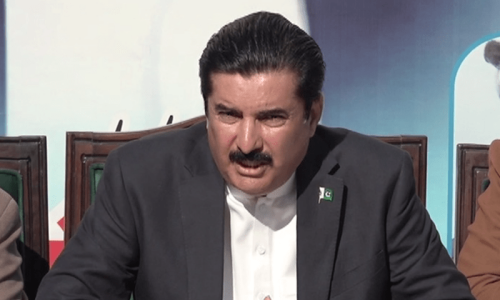ISLAMABAD: The lead defence counsel for former prime minister Nawaz Sharif in the Avenfield properties reference concluded his arguments on Wednesday with the claim that the prosecution has failed to establish its case and it is a fit case for acquittal.
Advocate Khawaja Haris covered different aspects of the reference and also quoted a number of legal precedents to support his claim that the prosecution has miserably failed to substantiate the allegations, hence the onus of proof could not be shifted to the accused person.
He referred to a 2007 judgement of the Sindh High Court passed in the Hakim Ali Zardari case and explained that in cases under Section 9(a)(v) of the NAB Ordinance, 1999, the prosecution was required to prove four ingredients — (a) the accused was holder of public office, (b) nature and extent of pecuniary resources or property which were found in his possession, (c) what were his known sources of income i.e. known to the prosecution after thorough investigation and (d) such resources or property found in possession of the accused were disproportionate to his known sources of income — to prove its case.
Lawyer says it’s a fit case for former prime minister’s acquittal
“There is no burden of proof on the accused when the prosecution could not prove these four ingredients,” he insisted.
Mr Haris said Wajid Zia, the head of the Joint Investigation Team (JIT) which probed Panamagate, admitted that Nawaz Sharif’s children were not dependent on him instead they were dependent on their grandfather, Mian Mohammad Sharif, even for their pocket money.
While reading from Wajid Zia’s statement and cross-examination, Mr Haris said that NAB’s key witness initially said the JIT had decided not to send a questionnaire to any witness, but later sent it to Freeman, in whose presence trust deeds were signed in February 2006, but the questionnaire was not sent to the Qatari royal despite his request. He said the Qatari royal never refused to cooperate with the JIT but it was the investigation team that avoided recording his statement.
Mr Haris argued that foreign documents, including letters that came from Financial Investigation Agency (FIA) of the British Virgin Island (BVI) and Dubai authorities, do not fulfill the criteria set in the Qanun-i-Shahadat (Law of Evidence).
The court asked Amjad Pervez, counsel of Maryam Nawaz and her spouse retired Capt Mohammad Safdar to start his arguments from June 28.
Published in Dawn, June 28th, 2018














































